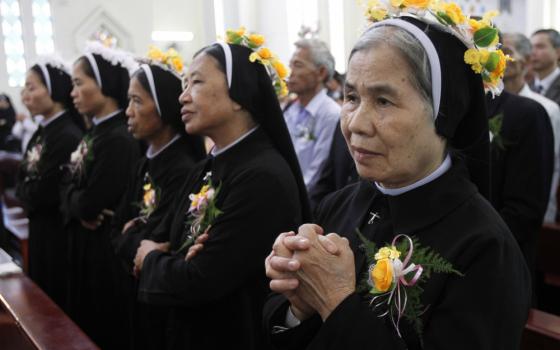Each day we read about the religious wars in various parts of the world, people claiming their dedication to God and God’s favor of them over others. How will we ever learn to respect and appreciate that God is One and that we all share commitment to that One but in different ways? Sr. Mai Thanh’s story last week on Global Sisters Report witnesses that building relationships is at the heart of inter-faith dialogue. Getting to know someone personally can break down the prejudices and antipathies that divide us. Mai’s story is so inspiring because her commitment grew out personal family experience. She was brought up in the beliefs and practices of Confucianism, eventually converted to Catholicism with the permission of her father, entered the convent and is now a major voice for interfaith dialogue in Vietnam.
I met Sister Mai in 2001 when I first visited Vietnam. Mai not only introduced me to the sisters where I began my own journey of relationship-building with them, but I learned about the long and interesting history of religious life in this fascinating and complex country. The tradition of religious life for women in Vietnam is centuries old, beginning with Buddhism and then Catholicism in the 1600s.
During my stay, Mai, however, didn’t just talk about Buddhist history and practice; she took me to visit a monastery of Buddhist nuns, her long-time friends. Mai and I entered the comforting peace and quiet of wooded grounds with the leader of the monastery, who explained that prayer and meditation are at the heart of their life, but that acts of charity and love are also essential. I heard the sweet chanting of the nuns in the temple and observed others here and there meditating alone. Other nuns I was told were outside caring for children or the poor. I remember how simple the nuns’ living spaces were – small rooms built on low platforms. Each nun seemed to have a small trunk for her necessary belongings, but not much else. As the community gathered for the noon meal in common, Mai and I were invited to the guest house for a vegetarian lunch. Before eating each dish we said special prayers, thanking the creator for these gifts that nurture life.
It is not uncommon these days to see Buddhist nuns in their gray gowns and shaved heads in airports. Education is important in the Buddhist tradition, and so some women attend universities abroad to be exposed to other cultures; others travel to establish new monasteries. Thus, both by lifestyle and engagement in dialogue groups, they participate in inter-faith exchange. The variety in forms of Buddhist nuns’ lives comes from hundreds of years of adaptation to many different cultures. I found a very interesting website that describes a contemporary monastery in Vietnam: “Novice Nuns in Vietnam” by Gael McKenzie. It is not surprising to note similarities of Buddhist monastic life with that of Catholic religious life in Vietnam: there are large numbers of young women who choose to enter, strong communal life, commitment to education, simplicity of lifestyle, commitment to the poor, discipline and an atmosphere of joy and laughter. All of these seem to reflect the general culture of religious life in the country.
Mai also educated me about the history of Catholic religious life for Vietnamese women. I was astonished to learn that the first indigenous group of sisters, Lovers of the Cross, was founded in 1670 by a French bishop, Lambert de La Mott. Today there are 24 independent diocesan congregations with that name in Vietnam. I have visited several of them in both south and north regions of the country, where they witnessed warm hospitality and strong commitment to the poor. Many of them along with other Vietnamese congregations also run “Love” (charity) schools for children who have no other opportunity for education. Many also work with the mountain people on the borders of Laos and Cambodia. This is their practical way of engaging in inter-faith dialogue, as most of the children’s families practice native religions.
Thanks to Mai, this first visit to Vietnam is still strong in my memory. I cannot thank her enough for showing me so many years ago that intellectual conversations about beliefs and practices are important, but that building relationships and witnessing belief in action are at the heart of interfaith dialogue.
[Joyce Meyer, PBVM, is the international liaison to women religious for Global Sisters Report.]
Related - Q & A with Sr. Mai Thanh and
Vietnamese nuns work with people of other faiths to provide free healthcare for poor patients by Joachim Pham.

